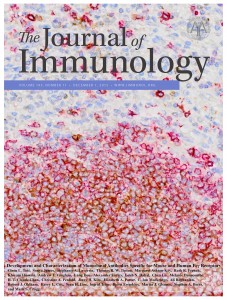This monthŌĆÖs Journal of ImmunologyŌĆÖs cover story features a large piece of collaborative work carried out by the University of SouthamptonŌĆÖs Antibody and Vaccine Group within Cancer Sciences.
Dr Stephen Beers who is Associate Professor in Cancer Immunology and Immunotherapy explains the science behind the picture and why identifying special receptors on cells is key to designing better treatments to treat aggressive cancers.
ŌĆ£Immunotherapy with antibodies is changing the way we treat many aggressive┬Ācancers which had previously been considered┬Āfatal.┬Ā Much of this success has come from a deep scientific understanding of how the┬Ābodyšs immune system recognises malignant cells and how antibody drugs┬Ācan be used to┬Āre-awaken immune cells which have been suppressed within the microenvironment of a growing┬Ācancer.┬Ā┬Ā
In this┬Ālatest article, the Antibody┬Āand Vaccine Group have developed unique reagents to characterise a family of┬Āreceptors, called Fc receptors, which play an important part in the bodyŌĆÖs immune system and in controlling the ability of antibody drugs to┬Ācontrol cancer. The image produced here shows a section of human spleen where we have labeled┬Āan important inhibitory immune receptor called Fc╬│RIIB (shown in brown) and┬ĀB cells, a special type of immune cell (shown in red).
Our┬Ācurrent research suggests that┬ĀFc╬│RIIB is a key regulator of immune function and can often dictate the┬Āsuccess of┬Āantibody treatment.┬Ā Being able to measure and possible block its inhibitory activity provides an exciting new line of investigation for the┬ĀAntibody and Vaccine Group.ŌĆØ
The striking front cover image was made by the UniversityŌĆÖs Stephanie Laversin, a member of Stephen Beersš Cancer Sciences research team.
See the Journalšs front cover and link to full article here .
